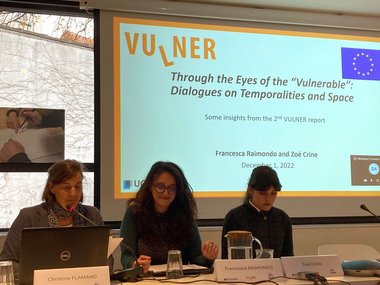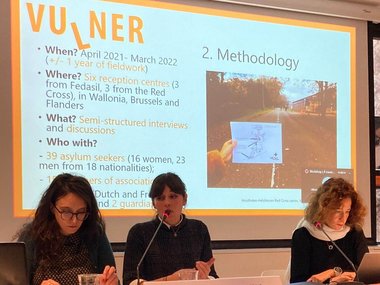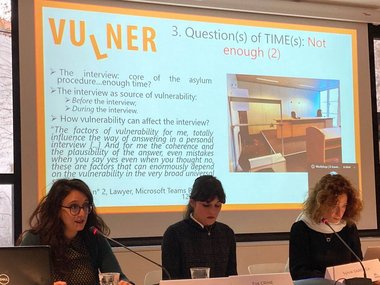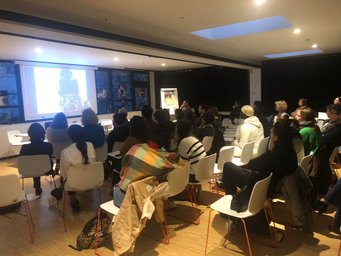Through the Eyes of the ‘Vulnerable’: Exploring Vulnerabilities in the Belgian Asylum System
The VULNER Belgium team, consisting of Sylvie Saroléa, Christine Flamand, Francesca Raimondo and Zoé Crine, held a workshop at the European House of Authors in Brussels on December 1st 2022 to discuss the team’s recently published second report on vulnerabilities in Belgium untitled 'Through the Eyes of the ‘Vulnerable’: Exploring Vulnerabilities in the Belgian Asylum System'. During the workshop, the VULNER Belgium team presented the findings of their second VULNER report and discussed them departing from two main axes: time and space.
The workshop was organised as follows. After the introduction of the afternoon's work by Christine Flamand, who mentioned the objectives and results which have been achieved by the project so far as well as the activities in which the Belgian team has been engaged, the floor was “virtually” given to an asylum seeker the Belgian team met during their second fieldwork phase, who was invited to tell his story. As he was finally unable to attend, key excerpts from his interview were read out before the two sessions began.
The first session was dedicated to the “time(s) of vulnerabilities”. Zoé Crine and Francesca Raimondo presented some of the results of the second fieldwork on the difficulties and challenges faced by asylum seekers related to the time of the asylum procedure and in the asylum procedure. Francesca and Zoé stressed also the role of other “actors” in the asylum procedure who were interviewed during the second fieldwork: lawyers, associations and NGOs, guardians. After the presentation, the debate opened, moderated by Prof. Sylvie Saroléa, leader of the Belgian team, with the lawyer Pierre Robert, the guardian Anne Grossi and Thomas Willekens from the Dutch-speaking association Vluchtelingenwerk Vlaanderen.
Anne Grossi shared her experience as a tutor, explaining her function in detail, talking about the difficulties she encountered. With reference to time, she explained how the unaccompanied minors she follows do not understand why the procedure is very slow and suffer a lot from its length. She also spoke about the waiting time needed to simply "get" a guardian (minors are sometimes left without one for several months). Furthermore, she told us about the pressure minors are under on many fronts. In particular, there is a discouragement with regard to schooling, exacerbated by the fact that their families in the country of origin do not always share its usefulness, given that the economic sacrifices that were made in order to get the child to leave their home country must be repaid, also with the minors’ work in Belgium.
The Lawyer Pierre Robert insisted on the fact that time of the procedure was a factor of vulnerability for the asylum seekers and shared his experience about people seeking asylum from a certain country (e.g.: El Salvador) that are not recognized as refugees in the Belgian asylum system. He also spoke about the asylum interview and the way vulnerability is actually considered in a very narrow way. He mentioned on top the problem of access to a lawyer in centres further away from the major cities, as those barely have the time to meet with asylum seekers located far from major city centres (which poses a problem in terms of the legal support that is provided to these people).
Thomas Willekens emphasised that sometimes it would be enough to apply the laws that already exist to concretely implement a more efficient and in a certain sense fairer asylum system.
The second session, after the coffee break, was dedicated to the “space of vulnerabilities”. Francesca Raimondo and Zoé Crine presented the results of the second report on space-related vulnerabilities and, more specifically, the difficulties related to life in reception centres. Particular attention was paid to the findings of the report related to particular groups deemed most vulnerable due to gender, age and physical and mental illness. Given the theme of the second session, the related debate, chaired by Prof. Marie-Sophie Devresse featured two directors of two reception centres – Carmen Salgado Gaeta, director of the Red Cross Centre in Uccle for unaccompanied minors and Thierry Pire, director of the Fedasil centre in Rixensart – and the director of the French-speaking association Cire, Sotieta Ngo. Carmen Salgado Gaeta highlighted the difficulties related to community life in reception centres, both and especially for asylum seekers, whose vulnerability is amplified by the young age of the residents of her centre, but also for the staff who work in a challenging environment. The director also highlighted a topical element, noting how the average age of residents in her centre has decreased, with an increasingly young population. Thierry Pire, in general, emphasised the importance of being careful about generalisations when talking about reception centres as they are all different, from infrastructure to resources. Furthermore, he shared good practices that are implemented in order to address asylum seekers vulnerabilities, such as private kitchens, nurseries, rooms with fewer people. Finally, Sotieta Ngo shared with the audience some stories of people living in the reception centres run by Cire, noting how vulnerability is a theoretical concept, but that it is experienced every day in reception centres, embedded in a reception system that is itself stigmatizing in the way it welcomes asylum seekers. She also emphasised how the system should favour individual rather than collective reception in reception centres, as it is less expensive but also tailored to respond to the needs and vulnerability of asylum seekers. In view of the current reception crisis in Belgium, Sotieta Ngo argued that the study of vulnerabilities is meaningless if it is not already part of a context where the minimum guarantees are given to the asylum seeker (for example, a dignified and decent reception).
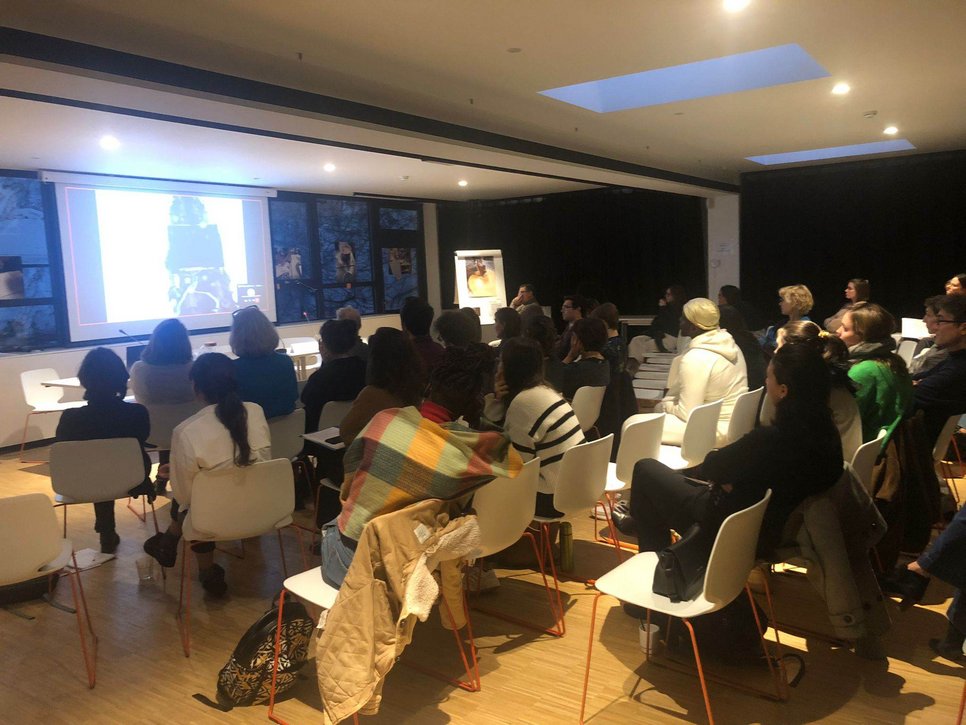
The debates were followed by the screening of the film by Bénédicte Liénard and Valérie Vanhoutvinck. Although it is a 2004 documentary in which the experiences of asylum seekers are narrated by the protagonists themselves, the members of the Belgian team highlighted how it is still highly topical and relevant today.
Luc Leboeuf, scientific coordinator of the VULNER project, drew conclusions of the workshop by bringing together the results of the Belgian team's second report and connecting them with the interventions and the reflections shared by all the participants to the workshop.
